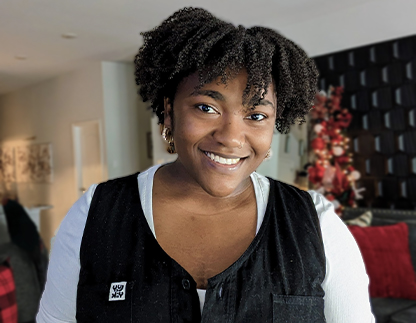I would tell my younger self to take the opportunities that seem scary to me. Those are the greatest opportunities to grow”
Dara Gaines
PhD Candidate in the Department of Political Science

Dara Gaines is a PhD candidate in the Department of Political Science in the Weinberg College of Arts and Sciences. Her dissertation examines how geography and race influence rural African American political attitudes and political behavior prediction. Her study relies on groundbreaking sociological and political science studies, bridging the gap between historical evidence and contemporary politics for African Americans who reside outside of urban areas.
How would you describe your research and/or work to a non-academic audience?
My work focuses on identifying the challenges and opportunities that rural African Americans contend with in today's political landscape. I am interested in what mobilizes and demobilizes African Americans in rural communities to participate in politics.
Tell us what inspired your research and/or work.
I am inspired by the community that I'm from. I grew up down a dirt road in a small town in Arkansas, and as I immersed myself in the discipline, I realized that stories like mine are rarely accounted for. I saw this as an opportunity to honor my family and their struggles as well as investigate ways to improve the situation of people like us.
What is a mistake you have learned from in your career?
I've learned that waiting for perfection is the easiest way to fail. So often, I find myself holding on to ideas and drafts, hoping that if no one sees them, no one can tell me I'm wrong. Unfortunately, the name of the game is constructive criticism. Since I came to this realization, I have recognized the importance of bravely sharing my work to make it better.
Whom do you admire in your field and otherwise, and why?
I admire the scholar-activists of the National Conference of Black Political Scientists like Dr. Mack Jones, Dr. Sharon Austin, Dr. Princess Williams, and more who have paved the way for me to discuss the struggles and accomplishments of Black people outside of cities. Their work has been pivotal in conceptualizing the processes at work in rural Black communities, and as pioneers, they used their life experiences to creatively shape the way they approached questions and solutions.
What do you find both rewarding and challenging about your research and/or work?
I'm constantly challenged to keep my work relevant to the people who stand to gain the most. It is easy to isolate the theoretical from the lived experience. I often get a gut check that reminds me of my privilege as a doctoral candidate compared to many of the people I discuss in my work.
What is the biggest potential impact or implication of your work?
My research shows that there are opportunities for rural Black citizens to be mobilized on local, state, and federal levels. I want my work to be used by political operatives to understand the who, what, where, and why of mobilizing rural Black people toward political power. My work shines a light on the people doing the unseen work to liberate people who have been systematically marginalized.
Why Northwestern?
I chose Northwestern because I felt like there was a place for me and my ideas here. I was able to show
up as my authentic self with my professors, advisers, and friends. I have been lucky enough to build a committee that respects my goals and wants to see me grow as a researcher and advocate.
How do you unwind after a long day?
At the end of a long day, I really appreciate a nice long walk with my dog, Fattie! He always finds something interesting to sniff or taste. After a walk, I'll normally prepare my dinner and spend some time watching a government show like Veep or The West Wing, depending on how much laughter I need.
How would your closest friends describe you?
My closest friends would describe me as open to new perspectives. They would describe me as
someone who can find a good time in the midst of any storm. I don't mind working hard and will help anyone I can.
What advice would you give your younger self or someone considering a similar path?
I would tell my younger self to take the opportunities that seem scary to me. Those are the greatest opportunities to grow. Once you conquer them, and you will, you'll be able to look back on the journey with pride.
What are you most proud of in your career to date?
I am most proud of my work as the deputy field director for the Chris Jones for Governor campaign. Dr. Chris Jones is the first Black person selected as the Democratic nominee for governor in the state of Arkansas. I helped inform Arkansans about the race as well as train volunteers to contact voters for this and future campaigns. As a first-time organizer, I facilitated text banking, phone banking, and canvassing activities, as well as two statewide tours.
Published: May 23, 2023
If you know a graduate student, postdoctoral trainee, graduate faculty member, staff member, or a member of our TGS alumni population who would make a great candidate for our TGS Spotlight Series, please complete this brief TGS Spotlight Series Nomination Form.